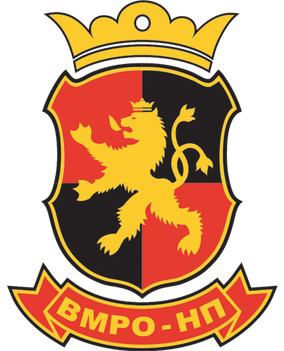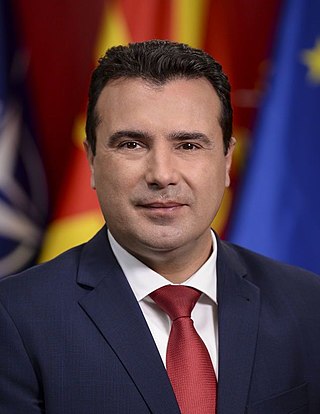
The Internal Macedonian Revolutionary Organization – Democratic Party for Macedonian National Unity, abbreviated as VMRO-DPMNE, is a conservative and the main centre-right to right-wing political party in North Macedonia.

The Social Democratic Union of Macedonia is a social-democratic political party, and the main centre-left party in North Macedonia. The party is pro-European.

The Democratic Union for Integration is the largest ethnic Albanian political party in North Macedonia and the third largest political party in the country. It was formed immediately after the country's 2001 armed conflict between the National Liberation Army and Macedonian security forces. NLA founder Ali Ahmeti has been the party's president ever since.

The Liberal Party of Macedonia was a conservative-liberal political party in North Macedonia. The party was a member of the Alliance of Liberals and Democrats for Europe Party. Its last chairman was Ivon Velichkovski.

The Socialist Party of Macedonia is a political party in North Macedonia founded on 22 September 1990 as a successor to the Socialist Alliance of Working People of Yugoslavia. The SPM proclaims itself to be a left-wing democratic socialist party. The SPM was part of the coalition governments from 1992 to 1998, led by the SDSM.

The Internal Macedonian Revolutionary Organization – People's Party, shortened as VMRO – People's Party and VMRO–NP, is a national-conservative political party in North Macedonia, founded by the former Prime Minister Ljubčo Georgievski, who split from the VMRO–DPMNE. The VMRO–NP was founded in Skopje on 4 July 2004. Vesna Janevska was elected as the party's first chairwoman. It is among the smaller parties of the country.

Nikola Gruevski is a former Macedonian politician who served as Prime Minister of Macedonia from 2006 until his resignation, which was caused by the 2016 Macedonian protests, and led the VMRO-DPMNE party from 2004 to 2017. He is the longest serving post-independence Macedonian prime minister, serving more than nine years in office.

Parliamentary elections were held in Macedonia on 5 July 2006. The VMRO-DPMNE-led coalition emerged as the largest group in the Assembly, winning 45 of the 120 seats. Its leader Nikola Gruevski became Prime Minister after forming a coalition government with the Democratic Party of Albanians, New Social Democratic Party, Democratic Renewal and the Party for a European Future.

Early parliamentary elections were held in Macedonia on 1 June 2008, after the Assembly voted to dissolve itself on 12 April 2008. The result was a victory for the VMRO-DPMNE-led alliance, which won 63 of the 120 seats in the Assembly.

The Liberal Democratic Party is a social-liberal political party in North Macedonia. The Liberal Democratic Party was launched in April 1997 as a merger between the Liberal Party and the Democratic Party. The first leader of the party was Petar Goshev from the Democrats, who was also the last president of the League of Communists of Macedonia. When the Liberal Party was re-established in 1999, a significant portion of the former Liberal Party remained in LDP.

The sixth local elections for the election of local mayors of the municipalities of the Republic of Macedonia and members of municipality councils were held on schedule in 2013. There were two large coalitions on the elections: the Coalition for a Better Macedonia led by VMRO-DPMNE and the Union for the Future led by SDSM. Also present on the elections was the Democratic Union for Integration (DUI), Democratic Party of Albanians (DPA) and the Union of Roma Forces. There was also coalition made between the two major rival parties VMRO-DPMNE and SDSM in Kičevo and Struga municipalities against the ethnic Albanian candidates Fatmir Dehari and Ramiz Merko of DUI. There were two rounds in the elections on March 24, 2013 and April 7, 2013. The first round of elections were declared the most peaceful elections in the history of independent Macedonia without any serious incidents. The elections were however not untainted, as the situation in the Centar Municipality was labeled as undemocratic by the Macedonian opposition with several voters being labeled as questionable for having only recently received their national ID cards and not being actual inhabitants of this respective municipality. The elections in this municipality lasted for three turns and were monitored by the foreign embassies.

Zoran Zaev is a Macedonian economist and politician who served as prime minister of North Macedonia from May 2017 to January 2020, and again from August 2020 to January 2022.

General elections[a] were held in the Republic of Macedonia in April 2014 to elect the President and members of parliament. The first round of the presidential elections were held on 13 April, with incumbent president Gjorge Ivanov finishing first with 53% of the vote. However, as he did not receive the support of 50% of all registered voters, a second round was held on 27 April, alongside parliamentary elections, with Ivanov and the ruling coalition led by VMRO-DPMNE claiming victory as Ivanov was elected president and the VMRO-DPMNE won 61 of the 123 seats in the Assembly.

The fourth Cabinet of Prime Minister Nikola Gruevski is the Republic of Macedonia Government cabinet announced on 19 June 2014. It is the 11th cabinet of the Republic of Macedonia. Gruevski's second cabinet was formed following the April 2014 election won by the right-wing VMRO-DPMNE.

Early parliamentary elections were held in Macedonia on 11 December 2016, having originally been planned for 24 April and later 5 June.

In April 2016, protests began in the Republic of Macedonia against the incumbent President Gjorge Ivanov and the government led by the interim Prime Minister Emil Dimitriev from the ruling VMRO-DPMNE party. Referred to by some as the Colorful Revolution, the protests started after the controversial decision by President Gjorge Ivanov to stop the investigation of former Prime Minister Nikola Gruevski and dozens of politicians who were allegedly involved in a wiretapping scandal. The demonstrations were organized by "Protestiram" and supported by a coalition led by the Social Democratic Union of Macedonia and other opposition parties, in addition to the newly formed Levica demanding that the government resign and be replaced by a transitional government and that the parliamentary elections planned for 5 June 2016 be cancelled, on the grounds that the conditions for free and transparent elections were not in place. The government and its supporters, who had organized pro-government rallies, maintained that the elections on June 5 were the only solution to the political crisis, with some observers blaming the opposition for creating a "Ukraine scenario" in Macedonia.
Storming of the Macedonian Parliament, also known as Bloody Thursday occurred on 27 April 2017, when about 200 Macedonian nationalists stormed the Macedonian Parliament in reaction to the election of Talat Xhaferi, an ethnic Albanian, as Speaker of the Assembly of the Republic of Macedonia. It was the biggest attack in history on a Macedonian institution.

Hristijan Mickoski is a Macedonian politician and former mechanical engineer, currently serving as Prime Minister of North Macedonia, a position he has held since 2024. He is also a university professor and the party leader of VMRO-DPMNE. In 2016, Mickoski became the director of Power Plants of Macedonia, and in the period from 2015 to 2017, he was an energy advisor to prime ministers Nikola Gruevski and Emil Dimitriev. As the sole candidate, he was elected leader of VMRO-DPMNE at the party's 16th congress in Valandovo.

Early parliamentary elections were held in North Macedonia on 15 July 2020. It was originally scheduled for November 2020, but Prime Minister Zoran Zaev called early elections after the European Council failed to come to an agreement on starting talks with North Macedonia on joining the European Union in October 2019. The election date was set for 12 April, but was postponed until July due to the COVID-19 pandemic in North Macedonia.

Parliamentary elections were held in North Macedonia on 8 May 2024. The slow pace of EU integration and corruption were the main issues during the campaign.
















